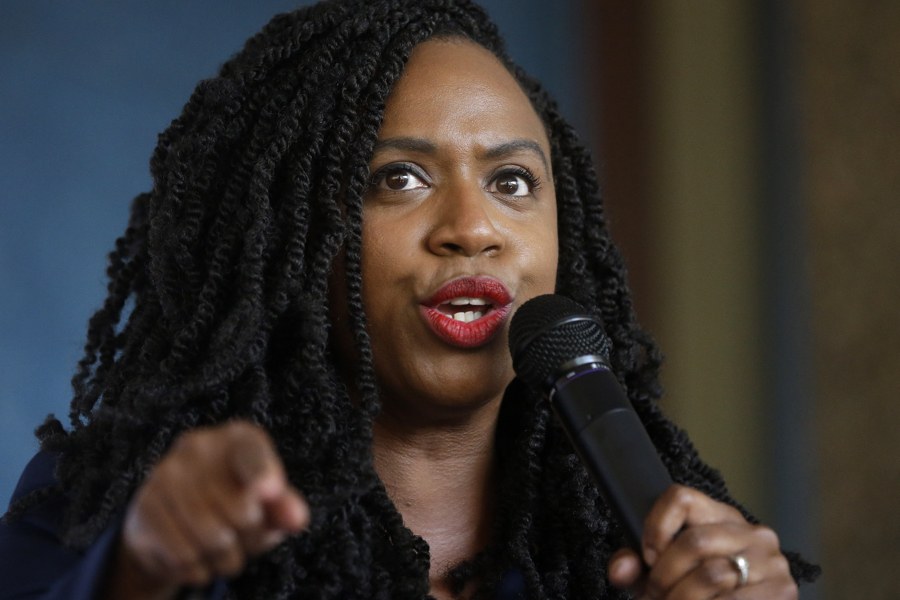Ayanna Pressley’s Response to Her Hair Loss Is Personal, Political—and Courageous
The congresswoman revealed she has alopecia in a video for The Root.

AP Photo/Steven Senne
Since her arrival in Washington, Ayanna Pressley’s hair has made headlines. The first black woman to represent Massachusetts in Congress, she sported her now-signature long, thick Senegalese twists on her campaign posters and on her inauguration day. Some, she recalled back in 2018, called the look unpolished, too ethnic, and too urban. But for many other women and girls, seeing a black woman embrace her hair on the House floor felt like a promise—that the representation they had been waiting for had finally arrived.
But those braids have been missing lately. In recent months, Pressley has abandoned her signature look for lace-front wigs—and in a video posted by The Root on Thursday, she explained why.
“I’m Congresswoman Ayanna Pressley, and this is a word about why my black hair story is both personal and political,” she begins.
In the six-and-a-half minute video, Pressley reveals publicly for the first time that she has alopecia, an autoimmune disorder that causes the body to attack its own hair follicles, resulting in hair loss. Pressley first noticed that she was shedding “sinkfuls of hair” last fall, and on the eve of the House’s vote on Donald Trump’s impeachment, the representative lost her final hair.
“I didn’t have the luxury of mourning what felt like the loss of a limb,” Pressley says, recounting how, on the day of the vote, she left the floor as quickly as possible and hid in a bathroom stall. “It was a moment of transformation not of my choosing.”
Since losing her hair, Pressley says, she has only been bald in the privacy of her own home and in the company of her closest friends. However, that changed when, at the end of her video, Pressley appears without her wig on camera for the first time. She says that thinking of all the young women who were inspired by her twists convinced her to go public: “I felt like I owed all those little girls an explanation.”
As the emotional video has made the rounds, fellow Massachusetts officials have voiced their support for Pressley’s bravery.
It’s no surprise to me – or anyone – that @AyannaPressley is sharing this deeply personal story with grace, style and passion. It’s just who she is and why she creates so much space for others to be their authentic selves. https://t.co/fbjG4Wn5Ez
— Maura Healey (@maura_healey) January 16, 2020
Thank you Congresswoman @RepPressley for sharing your powerful story and for showing the world what it means to embrace our own identities with grace and courage. https://t.co/tDZuyFgJuc
— Mayor Marty Walsh (@marty_walsh) January 16, 2020
The bravery of @AyannaPressley sets such a powerful example. Proud to count her as a friend, glad so many in the next generation have her as a role model, and hope some more in this generation summon even a little bit of Ayanna in the decisions they make. https://t.co/k6CnNUW5hc
— John Kerry (@JohnKerry) January 16, 2020
Pressley doesn’t shy away from how devastating the process of losing her hair has been. She says she faced mornings with dread, afraid to unwrap her hair and watch strands fall to the sink. She didn’t want to look in the mirror and see someone who “increasingly felt like a stranger to me.” To abandon her signature hairstyle, she says, felt like “cultural betrayal.”
When a woman experiences hair loss, well-meaning parties might say that it’s “just hair,” attempting to put the situation in perspective. But the flip side of that message is that caring about your hair is superficial—and the devastation a woman might feel after losing her hair is unjustified.
But through her unabashed vulnerability, Pressley introduced a new narrative: That, while hair is associated with beauty, it’s also deeply entangled with identity. Hair is never “just hair,” and Pressley has, since the beginning of her campaign for Congress, showed how hair represents power, race, and gender. Her twists set her apart as new and disruptive in a room full of short-haired, graying male heads. They drew the attention of girls and women who had never seen braids like theirs on campaign posters and on the House floor. They symbolized, like Rashida Tlaib’s swearing-in throbe and Ilhan Omar’s hijab, the long-awaited arrival of new energy and representation. It’s a truth that’s uncomfortable to recognize—because when hair isn’t “just hair,” the loss of it gains renewed, heartbreaking significance.
There’s a temptation to frame this video as a “you go, girl” moment for Pressley; to celebrate her positivity in the face of a challenge, her eagerness to move forward, and the progress she has made in accepting her medical condition. But to look past Pressley’s pain is to ignore her bravest statement—that hair loss is deeply personal and worthy of grief, especially for a woman of color.
“I’m a black woman in politics,” Pressley says simply. “And everything I do is political.”
Pressley knows that her body will forever be scrutinized. She knows that her hair was never “just hair,” and that shedding it will not make it any easier for her to move through the world as a black woman. She has gone through a real, painful loss—and is willing to experience visceral sadness in response to it on a public stage. That, I think, is unbelievably courageous.


